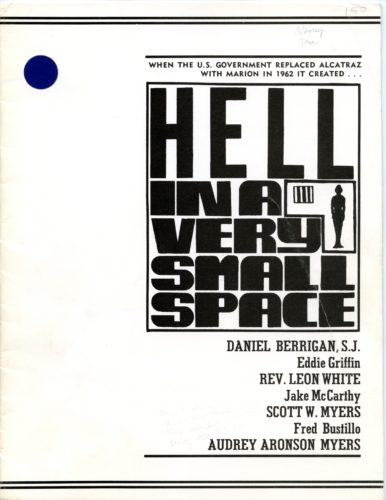Out of Control: Chapter 3–Hell in a Very Small Place
Steve and I reread the publication that radical priest Daniel Berrigan and others had written five years earlier. Hell In A Very Small Space reported that:
… the more important thing about Marion is that an eight-year struggle, involving prisoners, ex-prisoners, activists, lawyers, churches, professionals and students, has emerged as a force that the U.S. Bureau of Prisons cannot ignore. Years of lawsuits, hunger strikes, work stoppages, demonstrations, marches, petition drives and even sit-ins have begun to crumble the walls of secrecy and total authority that surround the federal prison system’s operations. (Preface to “Hell In A Very Small Space”)
Berrigan, who himself had been imprisoned for his anti-war activities, drew on the research the prisoners had conducted that revealed a 1962 Bureau of Prisons (BOP) meeting in Washington, DC between prison officials and social scientists. Billed as a management development program for prison wardens, it coincidentally took place the same year the BOP opened Marion.
Dr. Edgar Schein of MIT, a key player at that meeting, had written previously in a book entitled Coercive Persuasion about “brainwashing” of Chinese Prisoners of War (POWs). In the meeting he presented the ideas in a paper entitled “Man Against Man”:
In order to produce marked changes of attitude and/or behavior, it is necessary to weaken, undermine, or remove the supports of the old attitudes. Because most of these supports are the face-to-face confirmation of present behavior and attitudes, which are provided by those with whom close emotional ties exist, it is often necessary to break these emotional ties. This can be done either by removing the individual physically and preventing any communication with those whom he cares about, or by proving to him that those whom he respects are not worthy of it, and, indeed, should be actively mistrusted. . .
I would like to have you think of brainwashing, not in terms of politics, ethics, and morals, but in terms of the deliberate changing of human behavior and attitudes by a group of men who have relatively complete control over the environment in which the captive populace lives. (Berrigan, p. 6)
Along with these theories, Schein put forward a set of “practical recommendations,” throwing ethics and morals out the window.
They included physical removal of prisoners to areas sufficiently isolated to effectively break or seriously weaken close emotional ties; segregation of all natural leaders; spying on prisoners, reporting back private material; exploitation of opportunists and informers; convincing prisoners they can trust no one; systematic withholding of mail; building a group conviction among prisoners that they have been abandoned by or are totally isolated from their social order; using techniques of character invalidation, i.e. humiliation, revilement and shouting to induce feelings of fear, guilt and suggestibility; coupled with sleeplessness, an exacting prison regimen and periodic interrogational interviews.
So-called “brainwashing” strategies that involved physical as well as psychological abuse were being adopted from international arenas and applied inside U.S. prisons. Now, in 2011, similar strategies, honed in Marion and its progeny, are being employed around the world in the “war against terrorism.”
The prisoners never ceased resisting. In 1984, a year after the lockdown, a class action lawsuit was filed in federal court on behalf of the prisoners.
Political prisoner Bill Dunne, with the help of some people on the outside, edited a newsletter called The Marionette that appeared regularly for many years despite the repression and the efforts of the authorities to destroy it. By the time Steve and I got involved in 1985 the lockdown had been in place for a year and a half.
In June of 1985 a Congressional Subcommittee held hearings about Marion, in large part because lawyers and activists from the Marion Prisoners’ Rights Project had been agitating about control unit conditions—filing lawsuits, writing reports and articles, etc.
Although no changes were made as a result of those hearings, a 754 page free book was produced, and Chairman Robert Kastenmeier (D-Wis) stated that they would continue to monitor the situation. We encouraged people to send for it.




